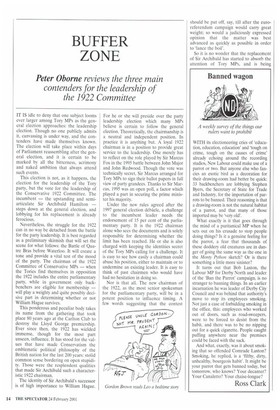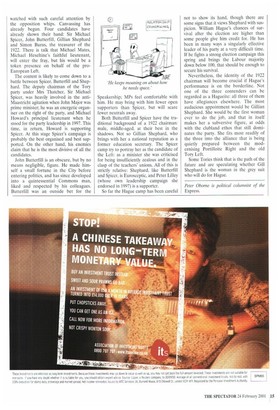Banned wagon
A weekly survey of the things our rulers want to prohibit
WITH its electioneering cries of 'education, education, education' and 'tough on crime, tough on the causes of crime' already echoing around the recording studios, New Labour could make use of a parrot or two. But anyone else who fancies an exotic bird as a decoration for their drawing-room had better be quick: 33 backbenchers are lobbying Stephen Byers, the Secretary of State for Trade and Industry, for the importation of parrots to be banned. Their reasoning is that a drawing-room is not the natural habitat of a parrot, and that many of those imported may be 'very old'.
What exactly is it that goes through the mind of a puritanical MP when he sets out on his crusade to stop people doing things? Is it a genuine feeling for the parrot, a fear that thousands of these doddery old creatures are in danger of going the same way as the one in the Monty Python sketch? Or is there something a little more sinister?
It turns out that Bob Laxton, the Labour MP for Derby North and leader of the 'Ban the Parrot' campaign, is no stranger to banning things. In an earlier incarnation he was leader of Derby City Council and was behind that authority's move to stop its employees smoking. Not just a case of forbidding smoking in the office, this: employees who worked out of doors, such as road-sweepers, were to be forced to desist from the habit, and there was to be no nipping out for a quick cigarette. People caught puffing anywhere near the premises could be faced with the sack.
And what, exactly, was it about smoking that so offended Comrade Laxton? Smoking, he replied, is a 'filthy, dirty, unhealthy, bourgeois habit'. It might be your parrot that gets banned today, but tomorrow, who knows? Your decanter? Your Canaletto? Your chaise-longue?
Ross Clark
watched with such careful attention by the opposition whips. Canvassing has already begun. Four candidates have already shown their hand: Sir Michael Spicer, John Butterfill, Gillian Shephard and Simon Burns, the treasurer of the 1922. There is talk that Michael Mates, Michael Heseltine's faithful lieutenant, will enter the fray, but his would be a token presence on behalf of the proEuropean Left.
The contest is likely to come down to a battle between Spicer, Butterfill and Shephard. The deputy chairman of the Tory party under Mrs Thatcher, Sir Michael Spicer, was heavily involved in the antiMaastricht agitation when John Major was prime minister; he was an energetic organiser on the right of the party, and Michael Howard's principal lieutenant when he stood for the party leadership in 1997. This time, in return, Howard is supporting Spicer. At this stage Spicer's campaign is probably the best organised and best supported. On the other hand, his enemies claim that he is the most divisive of all the candidates.
John Butterfill is an obscure, but by no means negligible, figure. He made himself a small fortune in the City before entering politics, and has since developed into a quintessential Commons man, liked and respected by his colleagues. Butterfill was an outside bet for the Speakership; MPs feel comfortable with him. He may bring with him fewer open supporters than Spicer, but will scare fewer neutrals away.
Both Butterfill and Spicer have the traditional background of a 1922 chairman: male, middle-aged, at their best in the shadows. Not so Gillian Shephard, who brings with her a national reputation as a former education secretary. The Spicer camp try to portray her as the candidate of the Left: as a minister she was criticised for being insufficiently zealous and in the clasp of the teachers' unions. All of this is strictly relative: Shephard, like Butterfill and Spicer, is Eurosceptic, and Peter Lilley (whose own leadership campaign she endorsed in 1997) is a supporter.
So far the Hague camp has been careful not to show its hand, though there are some signs that it views Shephard with suspicion. William Hague's chances of survival after the election are higher than some people give him credit for. He has been in many ways a singularly effective leader of his party at a very difficult time. If he fights a strong election campaign this spring and brings the Labour majority down below 100, that should be enough to secure his survival.
Nevertheless, the identity of the 1922 chairman will become crucial if Hague's performance is on the borderline. Not one of the three contenders can be regarded as a Hagueite: all three of them have allegiances elsewhere. The most audacious appointment would be Gillian Shephard. She would be the first woman ever to do the job, and that in itself makes her a subversive figure, at odds with the clubland ethos that still dominates the party. She fits most readily of the three into the alliance that is being quietly prepared between the modernising Portilloite Right and the old Tory Left.
Some Tories think that is the path of the future and are speculating whether Gill Shephard is the woman in the grey suit who will do for Hague.
Peter Oborne is political columnist of the Express



































































 Previous page
Previous page